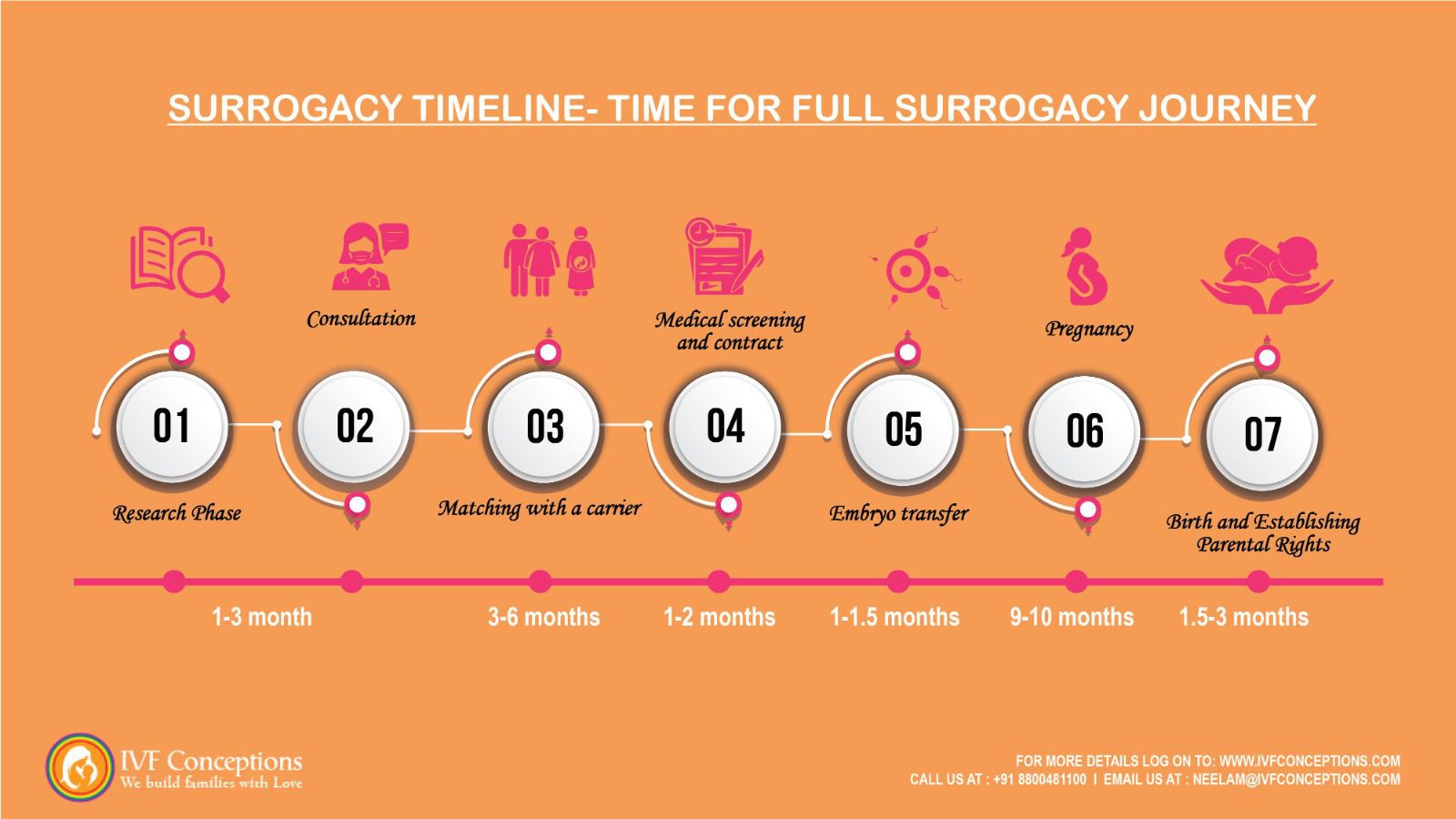What Is Surrogacy? Meaning, Definition, Types, cost and Process Explained
Surrogacy is an arrangement in which a woman carries and gives birth to a baby on behalf of another person or couple, commonly referred to as intended parents. This pathway to parenthood offers hope to individuals or couples who are unable to conceive or carry a pregnancy to term. Surrogacy is often seen as a compassionate and effective way for people to fulfill their dream of becoming parents, especially in cases of infertility or for LGBTQ+ couples.
In this blog, we’ll explore the meaning of surrogacy, the different types, and the overall process involved.
Third-party reproductive services involve a number of parties like the surrogate, intended parents and egg donor or sperm donor (in case), reproductive attorney, surrogacy agency, and last but not least a medical team of fertility specialists and gynecologists.
Get in touch for a Free Surrogacy Consultancy:
📲 +91-8800481100 ( WhatsApp, Line, Viber)
More about surrogacy:
What is the definition of surrogacy?
How does the surrogacy process work?
What is the average cost of surrogacy?
What is Surrogacy?
So, what is the meaning of surrogacy?
Surrogacy is an arrangement in which a woman, known as the surrogate mother, agrees to become pregnant, carry the pregnancy to term, and give birth to a child, all for the benefit of the intended parents. This arrangement allows individuals or couples, who may not be able to have children biologically, to have a child that is genetically related to one or both of them (in the case of gestational surrogacy).


Why Do People Choose Surrogacy?
Surrogacy can be an option for several reasons, including:
- Infertility Issues: Couples experiencing infertility or women who cannot carry a pregnancy safely can turn to surrogacy.
- Medical Conditions: Women with health conditions that make pregnancy dangerous may opt for surrogacy.
- Same-Sex Couples: Gay male couples may choose surrogacy, using one partner’s sperm and an egg donor to create an embryo for the surrogate to carry.
- Single Intended Parents: Single individuals looking to have a biological child can also benefit from surrogacy.
Surrogacy offers a chance for individuals and couples to experience the joy of parenthood, even when traditional methods are not possible.

 Types of Surrogacy
Types of Surrogacy
There are two main types of surrogacy: traditional surrogacy and gestational surrogacy. The primary difference lies in the genetic relationship between the surrogate and the baby.
1. Traditional Surrogacy
In traditional surrogacy, the surrogate is both the egg donor and the woman who carries the pregnancy. The surrogate’s egg is fertilized with the sperm from the intended father or a sperm donor through intrauterine insemination (IUI) or in vitro fertilization (IVF). This means that the surrogate is genetically related to the child.
Key Points about Traditional Surrogacy:
- The surrogate provides her own egg.
- The child is genetically related to the surrogate.
- It is less common due to the complex legal and emotional implications.
2. Gestational Surrogacy
Gestational surrogacy is more common and involves the use of an embryo created through IVF. The embryo is made using an egg from a donor or the intended mother and sperm from a donor or the intended father. The surrogate, in this case, is not genetically related to the baby, as she only carries the pregnancy.
Key Points about Gestational Surrogacy:
- The surrogate has no genetic link to the child.
- The embryo is created using IVF.
- Gestational surrogacy is more legally straightforward in most countries.


The Surrogacy Process – How does surrogacy work
The surrogacy process takes 18 months to 24 months depending upon the individual circumstances
Outlines the surrogacy process timeline for intended parents:
|
Stage |
Description of Stage |
Duration |
|
Research Phase |
Explore family building options and decide on surrogacy. |
Personal timeframe |
|
Consultation and Application |
Choose a surrogacy agency, sign agreement, and start embryo creation (if needed). |
1-3 Months |
|
Matching |
Agency finds and presents potential gestational carriers. Meet and decide on a match. |
3-6 Months |
|
Medical Screening and Contracts |
Carrier undergoes medical and psychological screening. Sign surrogacy contract. |
1-2 Months |
|
Embryo Transfer |
Prepare for embryo transfer. Success may take multiple attempts. |
1-1.5 Months |
|
Pregnancy |
Gestational carrier’s pregnancy, approximately 40 weeks. |
9-10 Months |
|
Birth and Postpartum |
Baby’s birth, establish parental rights, and postpartum period. |
1.5-3 Months |
Please keep in mind that the durations mentioned in the table are approximate and can vary depending on individual circumstances and other factors. Always consult with a reputable surrogacy agency or professional to get personalized guidance throughout the surrogacy journey.
The surrogacy process involves several stages that need to be followed meticulously to ensure legal and medical compliance. Below is a step-by-step breakdown:
1. Choosing the Right Surrogacy Arrangement
Intended parents must first decide whether they prefer traditional or gestational surrogacy. Most choose gestational surrogacy due to fewer legal complications.
2. Selecting an Egg Donor or Sperm Donor (If Needed)
For gestational surrogacy, intended parents may need an egg donor or sperm donor, depending on their circumstances. Egg or sperm donors can be known individuals or chosen anonymously through agencies.
3. Finding a Surrogate
Finding a suitable surrogate mother can be done independently or through surrogacy agencies. Agencies offer extensive screening and support to ensure the surrogate is physically and emotionally prepared.
4. Legal Contracts
Before any medical procedures, a comprehensive legal contract must be established between the surrogate and the intended parents. This contract protects the rights of both parties and outlines financial compensation, medical care, and parental rights. It’s essential to work with a legal expert in surrogacy law.
5. Medical Procedures
Once legal agreements are in place, the IVF process begins. If gestational surrogacy is used, an embryo is created and transferred to the surrogate’s uterus. Regular medical care and monitoring continue throughout the pregnancy.
6. Birth and Parental Rights
When the child is born, the intended parents are granted legal rights, as per the surrogacy agreement. In most cases, their names are listed on the birth certificate as the child’s legal parents.
Surrogacy costs resources worldwide:
Top 4 cheapest countries for surrogacy
Best Countries for Surrogacy 2023- Top International Destinations
Risks of international surrogacy
Global International Surrogacy Options
Surrogacy In Mexico-Everything Intended Parents Need To Know
Cheapest Country For Gay Surrogacy- Colombia
Low-cost surrogate mother in Argentina
Low-cost surrogate mother in Kazakhstan
Surrogacy Price – How much does surrogacy cost?
Surrogacy is a costly process due to medical treatments, legal fees, and surrogate compensation. The costs vary based on the country, the type of surrogacy, and the surrogacy agency involved.
| Cost Component | Estimated Range (USD) |
| Surrogate Compensation | $35,000 – $60,000 |
| Agency Fees | $15,000 – $30,000 |
| IVF and Medical Procedures | $30,000 – $50,000 |
| Legal Fees | $10,000 – $15,000 |
| Insurance for Surrogate | $10,000 – $30,000 |
| Total Costs | $90,000 – $150,000+ |
Surrogacy costs can be higher in countries like the United States but may be more affordable in countries like Georgia, Colombia, and Mexico, where surrogacy is legal and regulated.
Legal Considerations in Surrogacy
The legal framework surrounding surrogacy differs from country to country, and even within states or provinces. Understanding the laws where you plan to pursue surrogacy is crucial to a successful process. Key legal points to consider include:
- Parental Rights: Ensure that both intended parents can be recognized as legal parents of the child.
- Surrogacy Agreements: A solid legal agreement must outline the responsibilities and rights of both the surrogate and intended parents.
- Citizenship: If pursuing surrogacy internationally, ensure that the child can acquire citizenship in your home country.
Challenges and Considerations in Surrogacy
While surrogacy offers an incredible opportunity for many to experience parenthood, it comes with its challenges:
- High Costs: Surrogacy can be expensive, particularly in countries with stringent regulations like the U.S.
- Legal Complications: Surrogacy laws can be complex and vary widely across jurisdictions, making it essential to have expert legal support.
- Emotional Impact: The process can be emotionally taxing for both the intended parents and the surrogate, as it involves medical, legal, and personal commitments.
- Availability of Surrogates: Finding the right surrogate can take time and requires thorough vetting to ensure compatibility and preparedness.
International Surrogacy: Key Destinations for Intended Parents
International surrogacy has become an increasingly popular option for intended parents seeking affordable and legally viable options for building their families. Countries around the world offer different legal frameworks, cost structures, and levels of accessibility for surrogacy arrangements.
Let’s explore some of the most prominent countries where surrogacy is either regulated or permitted:
1. Surrogacy in Mexico
Mexico is one of the growing hubs for surrogacy, especially for international intended parents. The country offers affordable surrogacy options, with significantly lower costs than the United States or Canada.
Key Points:
- Cost: $50,000 – $70,000
- Legal Status: Regulated in certain states
- Best for: LGBTQ+ couples, single parents, heterosexual couples
2. Surrogacy in Colombia
Colombia has recently become a destination for surrogacy due to its lower costs and favorable legal environment. Surrogacy is legal, and the process is available for both domestic and international intended parents. The legal framework offers protection for all parties involved, making it a secure option for surrogacy arrangements.
Key Points:
- Cost: $50,000 – $80,000
- Legal Status: Permitted, with legal protections in place
- Best for: Heterosexual and LGBTQ+ couples, single parents
3. Surrogacy in Argentina
While Argentina does not have specific surrogacy laws, surrogacy arrangements are not explicitly banned. The country has seen a rise in international surrogacy arrangements, especially for LGBTQ+ couples. Buenos Aires, in particular, has been a growing destination due to favorable rulings for intended parents.
Key Points:
- Cost: $50,000 – $70,000
- Legal Status: Not explicitly regulated, but allowed in certain regions
- Best for: LGBTQ+ couples, heterosexual couples
4. Surrogacy in Georgia
Georgia is one of the most surrogacy-friendly countries in Europe, offering affordable and legally clear surrogacy processes. Only heterosexual couples are allowed to engage in surrogacy arrangements in Georgia, and the laws favor the intended parents, providing them with legal rights from birth.
Key Points:
- Cost: $50,000 – $65,000
- Legal Status: Legal, but only for heterosexual couples
- Best for: Married heterosexual couples
5. Surrogacy in Ukraine
Ukraine has long been a popular destination for international surrogacy, especially for heterosexual couples. The country has clear laws that protect the rights of intended parents, ensuring that they are the legal parents from the moment of birth. While the ongoing conflict has affected surrogacy arrangements in certain regions, Ukraine remains an option for many.
Key Points:
- Cost: $45,000 – $65,000
- Legal Status: Legal, only for heterosexual couples
- Best for: Heterosexual married couples
6. Surrogacy in India
India was once a leading destination for international surrogacy, particularly due to its affordability and a large number of surrogates. However, as of 2021, India has banned surrogacy for international intended parents and restricted it to domestic residents under specific conditions, making it no longer an option for foreign couples.
Key Points:
- Cost: Previously $20,000 – $35,000
- Legal Status: Banned for international surrogacy (only domestic)
- Best for: Indian residents
International Surrogacy Comparison Table
| Country | Cost | Legal Status | Best For | Key Considerations |
| Mexico | $50,000 – $70,000 | Regulated in certain states | LGBTQ+ couples, single parents, heterosexual couples | Choose regions like Tabasco and Sinaloa for clearer regulations. |
| Colombia | $50,000 – $80,000 | Permitted with legal protections | Heterosexual and LGBTQ+ couples, single parents | Growing surrogacy destination with favorable legal protections for intended parents. |
| Argentina | $50,000 – $70,000 | Not explicitly regulated, but allowed in some areas | LGBTQ+ couples, heterosexual couples | Surrogacy laws vary by region, particularly favorable in Buenos Aires. |
| Georgia | $50,000 – $65,000 | Legal, but only for heterosexual couples | Married heterosexual couples | Well-established surrogacy laws offering clear protections for intended parents. |
| Ukraine | $45,000 – $65,000 | Legal, only for heterosexual couples | Heterosexual married couples | Strong legal framework, but conflict in certain regions may affect arrangements. |
| India | Previously $20,000 – $35,000 | Banned for international intended parents | Indian residents | International surrogacy no longer allowed; restrictions in place for domestic surrogacy. |
Gestational Vs Traditional surrogacy
Conclusion: Is Surrogacy Right for You?
Surrogacy provides an incredible opportunity for individuals and couples to become parents when traditional methods are not possible. It offers the chance to have a biological child and experience the joys of parenthood. While it involves significant legal, financial, and emotional commitments, the reward of holding your child in your arms makes it a worthwhile journey for many.
But in the end, it is a worthy and meaningful journey for both the surrogate and commissioning parents.
If you’d like to learn more about IVF, Egg Donation, or surrogacy services globally, check out the rest of our website at IVF Conceptions. We offer legally secure and affordable surrogacy consulting services for FREE.
Get in touch now to get started! We recommend sending an email or fill the forms below to know your best surrogacy options worldwide.
Get in touch for a Free Surrogacy Consultancy:
📲 +91-8800481100 ( WhatsApp, Line, Viber)

 FAQs: What is the Meaning of Surrogacy?
FAQs: What is the Meaning of Surrogacy?
1. What is surrogacy?
Surrogacy is an arrangement where a woman (the surrogate) agrees to carry and give birth to a child for another person or couple (the intended parents). The intended parents may use their own genetic material, or donated eggs and sperm, to create the embryo.
2. What are the types of surrogacy?
There are two types of surrogacy:
- Traditional Surrogacy: The surrogate’s own egg is fertilized using the sperm of the intended father or a donor, making her the biological mother of the child.
- Gestational Surrogacy: The surrogate carries an embryo created from the egg and sperm of the intended parents or donors, meaning the surrogate has no genetic link to the child.
3. Who uses surrogacy?
Surrogacy is commonly used by couples facing infertility, LGBTQ+ couples, single parents, and women unable to carry a pregnancy due to health risks. It provides a pathway to parenthood for those who cannot conceive or safely carry a pregnancy.
4. Is surrogacy legal?
The legality of surrogacy varies by country and region. Some places fully allow it with regulated processes, while others prohibit or place restrictions on it. It’s important to understand the legal framework of the country or state where you are pursuing surrogacy.
5. How much does surrogacy cost?
Surrogacy can be expensive, with costs typically ranging from $50,000 to over $150,000 depending on the country, agency fees, medical expenses, and surrogate compensation. Costs also vary based on whether it is a domestic or international surrogacy arrangement.
6. What rights do the intended parents have in surrogacy?
In many countries with surrogacy regulations, intended parents are granted legal rights to the child either through a pre-birth or post-birth process. It’s essential to ensure that legal agreements are in place to secure the intended parents’ rights before the child is born.
7. What is the surrogate’s role in the process?
The surrogate’s role is to carry and deliver the baby for the intended parents. In gestational surrogacy, she has no genetic connection to the child. Her responsibilities are to follow medical protocols and maintain her health during pregnancy to ensure a safe delivery.
8. What happens if the surrogate wants to keep the baby?
In regulated countries, surrogacy agreements are legally binding, and the surrogate has no legal claim to the baby after birth. However, in some countries without clear regulations, disputes can arise. Working with experienced legal professionals ensures protection for all parties.
9. Can surrogates be compensated?
In some countries, surrogates receive compensation beyond covering pregnancy-related expenses. This is known as commercial surrogacy. In other countries, surrogacy may be restricted to altruistic surrogacy, where only medical and incidental costs are covered, with no additional compensation.
10. How do you choose a surrogate?
Most intended parents work with surrogacy agencies to find a surrogate who meets specific criteria, including health and psychological screening. Some individuals choose a surrogate they know, such as a friend or family member.



